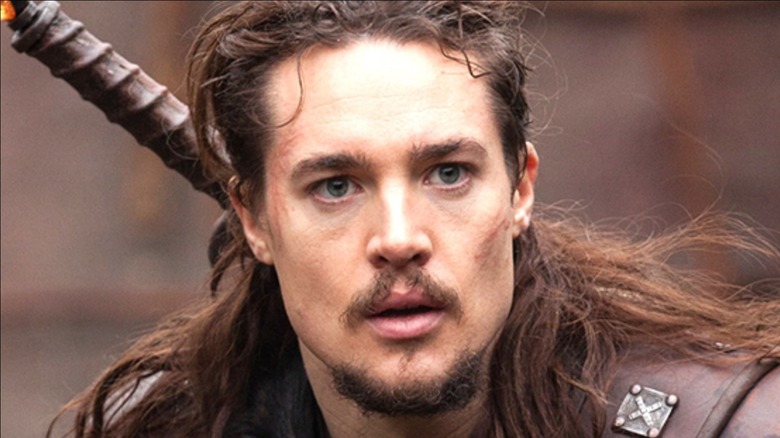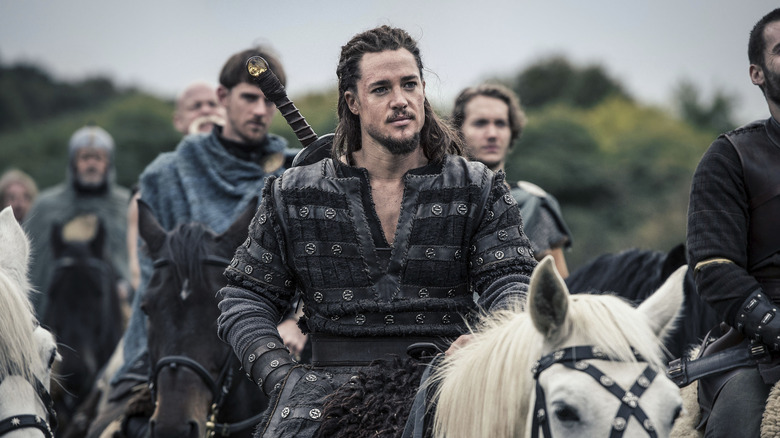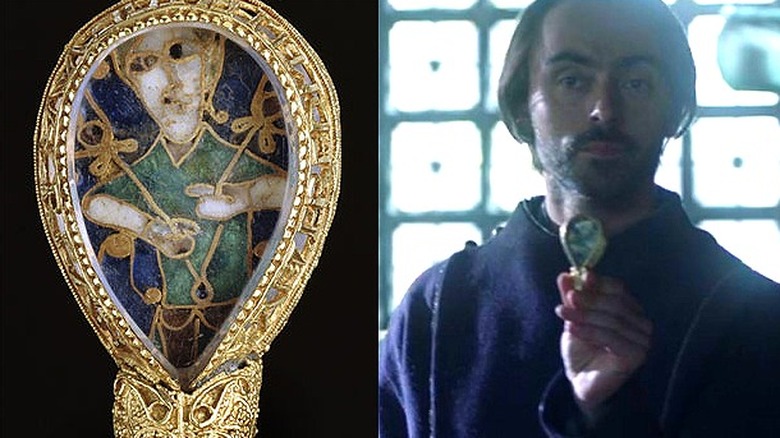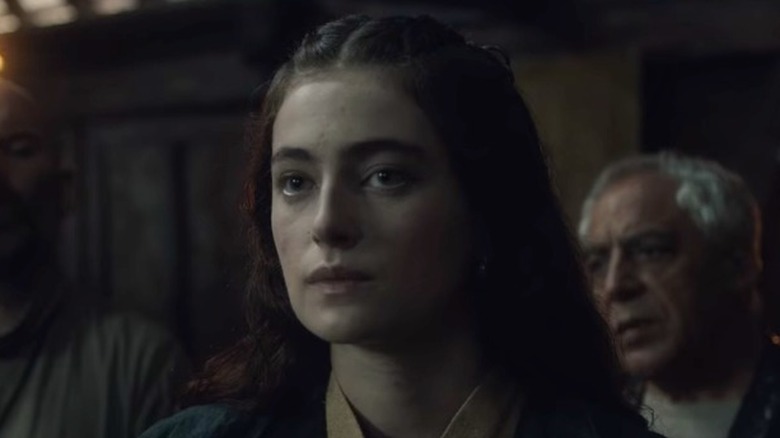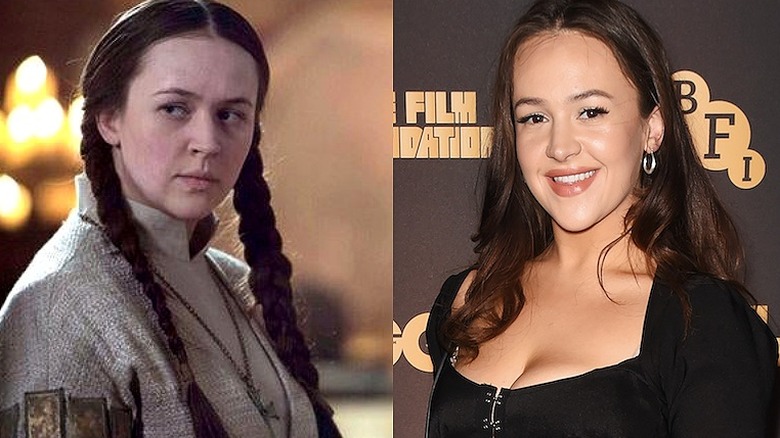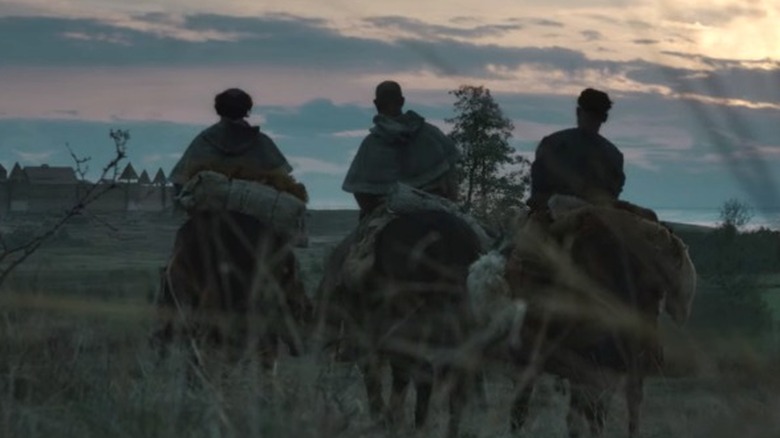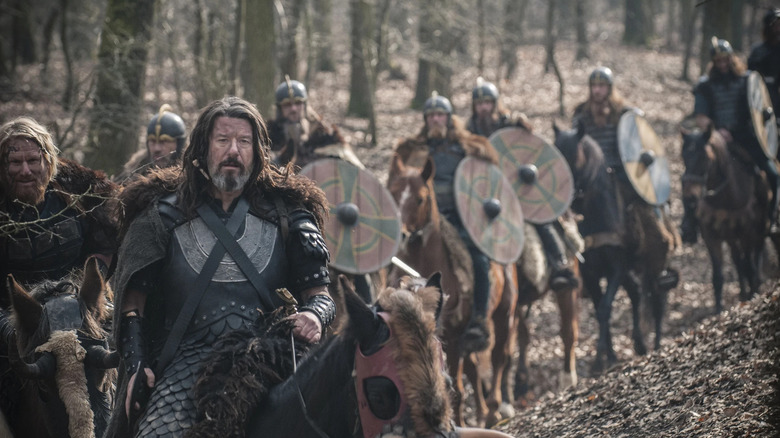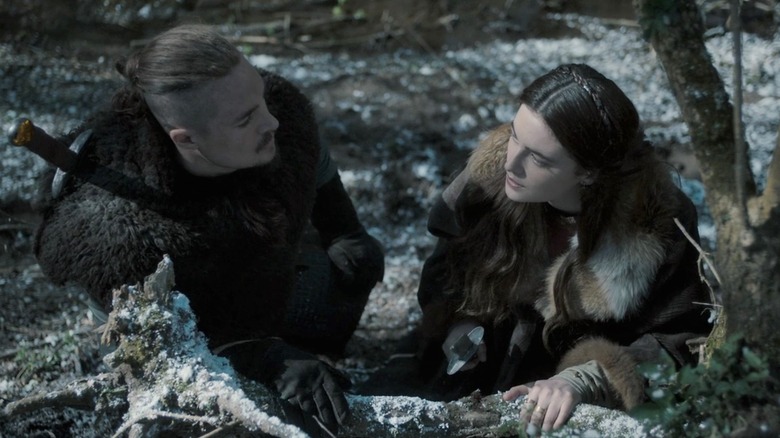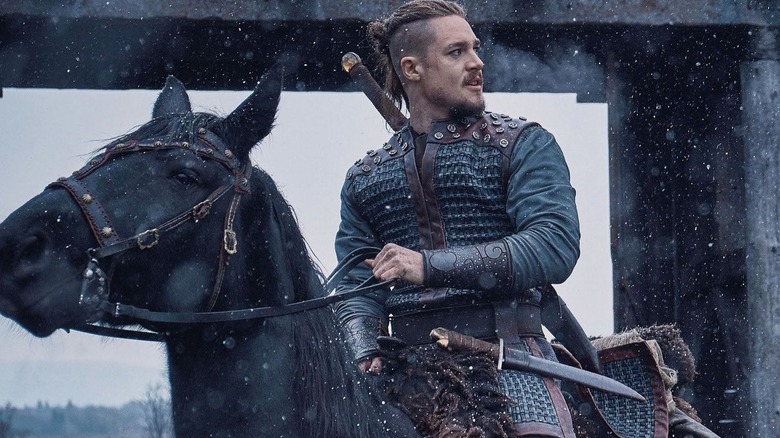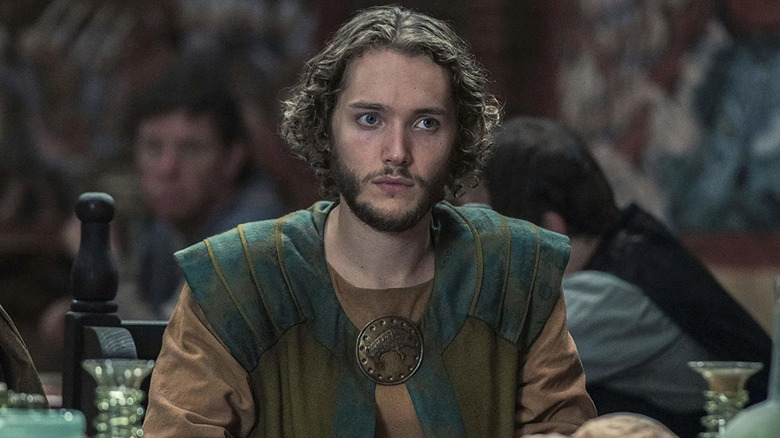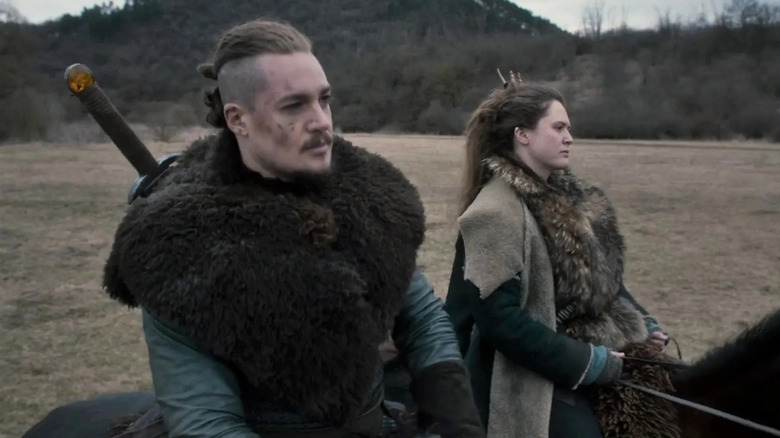The Untold Truth Of The Last Kingdom
Less than a year after its debut on the BBC, "The Last Kingdom" — an adaptation of author Bernard Cornwell's "The Saxon Stories" — appeared on Netflix and developed a massive, loyal following in relatively short order. Starring familiar period piece actor David Dawson (of "Peaky Blinders," "The Hollow Crown," and "Ripper Street") as the legendary and historical King Alfred the Great, the series is set in the ninth century and centers on the revered English monarch's (fictional) right-hand warrior, Uhtred of Bebbenberg (Alexander Dreymon). The charismatic pagan Uhtred — a Saxon who was raised by Danes (aka Vikings) — reluctantly swears allegiance to the Christian Alfred in an effort to take back his fortress and lands in Bebbanburg, which was stolen from him by his conniving uncle upon his father's death. There's a bit of "Hamlet," a bit of "Vikings," and a whole lot of real-life history in the series, whose focus on the religious conflict of the era adds intriguing layers to the show's thematic resonance.
The show's title, of course, refers to the kingdom of Wessex, which the real-life Alfred managed to keep intact for the duration of his reign, despite the encroaching and ever-present threat of the Danes and their desire for expansion. Although the word "England" would have meant little to your average ninth-century Saxon, Alfred's defense of Wessex, his skilled diplomacy, and his astute understanding and documentation of his opposition allowed his grandson Athelstan to unite the various Saxon kingdoms and form the country we know today. It's a complex and fascinating tale, as is the story behind its fictional depiction in "The Last Kingdom."
Yes, there was a real Uhtred. No, this isn't him
If you're a fan of historical fiction, it's likely you did your due diligence and looked into the accuracy of "The Last Kingdom" about 20 minutes into Episode 1. A cursory glance at any article detailing the "real" Uhtred probably revealed that Dreymon's warrior has little in common with history's "Uhtred the Bold," who was born roughly 100 years after the series is set. But what's interesting is not that the book and series take liberties with history ('tis the genre), but that Bernard Cornwell's inspiration for his stubborn, endearing Saxon-Dane hybrid came not from a historical account, but from his own family.
As Cornwell explained to The Guardian in 2015, "most historical novels have a big story, and a little story -– you flip them and put the little story in the foreground." His big story was, of course, Alfred's successful efforts to hold back the Danes and lay the groundwork for what would become England. His little story came to him after the adopted Cornwell met his birth father, William Outhred (sound familiar?). The author explained that his family tree dated back to the 6th century, and that they were "the Lords of Bebbanburg (Bamburgh Castle) in Northumberland, there was an Uhtred." Although the author admits that history "(knows) sod all about him," he nonetheless credits finding the name amongst his ancestry with inspiring his beloved, conflicted Saxon badass. As Cornwell put it, "the moment I met my real family, I thought: 'Somehow this family survived the coming of the Danes, the Vikings, all the way through to King Canute, there was a family connection." So while Uhtred of "The Last Kingdom" isn't Uhtred of history, he was nonetheless inspired by someone equally as real.
The Last Kingdom cues in on some small historical details about Alfred
Unlike the show's sword-wielding protagonist, its cunning and pious king, Alfred, was very real. Moreover, the narrative largely sticks to our current understanding of the only king in English history ever to be dubbed "Great," right down to key details. Scholars and authors like Cornwell have long looked to the Welsh bishop Asser's "Life of Alfred" (referenced in the series) as a means of teasing out fact from legend. For instance, throughout the series, audiences see Alfred struggle with a debilitating disease that affects his digestion. In studying Asser's documentation of Alfred's symptoms, researchers eventually came to believe that the famed monarch suffered from Crohn's Disease (via Cultural Heritage Through Image).
Alfred's physicality isn't the only historical detail to make its way into the show. During Alfred's time on the run in the marshes (a story that also appears, by all accounts, to be true), the fleeing monarch accidentally burns several "cakes" of bread. While the brief scene might seem like mere character development to American audiences, the story of "Alfred and the Cakes" is what Historic UK calls "one of the best known stories in English history."
There's a physical artifact that makes its way into the show as well. As Prof. Howard M. R. Williams points out in a piece for Archeodeath, the series' prominent placement of an artifact known as Alfred's Jewel "affords an aura of authenticity to the show." As you may recall, Alfred gives Aethelwold (Harry McEntire) a gold-encased, teardrop-shaped jewel before he leaves for Northumbria. It's a stunning recreation of the actual artifact, which has long been associated with Alfred thanks to its location, age, and inscription, which reads: "Alfred ordered me to be made" (via Ashmolean Museum).
The Last Kingdom's author doesn't like Game of Thrones
"The Last Kingdom" has been compared numerous times to HBO's George R.R. Martin adaptation "Game of Thrones." Admittedly, both narratives are set on a continent filled with squabbling kingdoms and conflicting religions, and have shared historical inspirations. However, Cornwell has little love for the fantasy show, and it has nothing to do with its controversial finale.
In a Radio Times interview shared by The Belfast Telegraph, Cornwell criticized the series, saying "You have to have large sections where the plot is explained, (and you) just have to sit there ... This is very, very dull. So they put a lot of naked women behind it all," something he said his stories didn't require. Cornwell also distanced himself from "Thrones" in an interview with The Guardian, saying, "unless the appeal is brutal men in chain mail ... I can't see anything else we have in common. This is rooted in reality ... Uhtred would love to have dragons. But he can't, at that point viewers would say, excuse me."
Cornwell later praised society's recent rejection of the romanticization of such eras, saying "It was a terrible, terrible time to be alive ... the heroic age, we have turned our back on it, and I am glad of that. I don't want to live in an age when alpha males have carte blanche to do whatever they want." Although he doesn't explicitly refer back to "Game of Thrones" in his later comment, Cornwell's strong female leads (many of whom are based in fact) are allowed to keep their clothes on, and (barring a major detour from its source material) "The Last Kingdom" will no doubt avoid the criticism that has plagued "Game of Thrones" regarding its treatment of women (via Esquire).
The Last Kingdom's Eliza Butterworth is much younger than the character she portrays
Of all the various character arcs in "The Last Kingdom," Queen Aelswith's just might be the most sneakily dynamic. As the strict, sober, and fundamentally Christian Saxon consort, Aelswith doesn't share Alfred's conflicted affinity for Uhtred, and continuously tries to convince her husband to cut ties with the man she views as nothing but an untrustworthy, godless heathen.
For the majority of the series, this places her character at odds with fans. By Season 4, however, we begin to see that beneath her stony exterior, there's a highly intelligent leader and diplomat embittered by her society's refusal to see her as anything but a wife and mother. In many ways, she acts as a Saxon foil to the Viking Brida (Emily Cox) who is equally set in her beliefs and also finds herself at odds with both Uhtred and the patriarchal society of the Saxons. The actor behind this complex queen is Eliza Butterworth, and, despite the show's best attempts to portray her as quite a bit older than she is, Butterworth is just 27 years-old — the same age as actors Timothy Innes and Millie Brady, who play her grown-up onscreen children.
In fairness, Aelswith is quite young when she marries Alfred in Season 1, and to replace her with another actor would have been not only jarring to viewers, but a detriment to the character. Butterworth told Express UK that she "enjoyed the challenge of playing someone older," and altered her voice in later seasons to ensure she sounded "older than her onscreen children." When fans discovered the ages of all three actors, they were not only shocked, but, as this thread on "The Last Kingdom" subreddit shows, even more blown away by Butterworth's skill. Clearly, the series creators also saw her potential, since they made Aelswith a much more prominent figure in "The Last Kingdom" than she was in "The Saxon Stories."
Most of The Last Kingdom isn't actually filmed in England
Although all four seasons of "The Last Kingdom" take place amidst the various kingdoms and sprawling lands that would one day become the United Kingdom, most of the series isn't actually filmed there, but in Hungary. Winchester, for instance, as Radio Times revealed, is comprised of "elaborate sets that have been built near the village of Göböljárás" (just west of Budapest), while Season 4's scenes in the wilderness surrounding Wessex were shot in the heavily forested and hill-laced landscape of Dobogókő, north of the Hungarian capital. After losing access to the Bebbanburg set from Seasons 1 and 2, the crew set to work reconstructing the fortress in Hungary, making every effort to breathe realistic life into Uhtred's home. As production designer Dominic Hyman explained, not only did the team have to ensure continuity, they also had to make the fortress look as though it "had that 20 to 25 years of weather and experience and neglect and sadness within it."
As Martyn John, the locations manager for the show's first two seasons, explained, "You go 45 minutes outside of Budapest and you're in the middle of nowhere ... You can't do that anywhere in the UK. To get landscape of that scale and variety you have to travel to Scotland or to North Wales, whereas in Budapest it's all there for you." Except, that is, for a coastline. For scenes of that nature, the series originally went to North Wales, and later, County Durham in Northeast England. Moreover, as Executive Producer Nigel Marchant shared with the outlet, "I think what Hungary brings to us is this sense of other world. We don't really know what England looked like 1,000 years ago, so although it's not England and we shot it on location, it has this sense of otherness to it that I've always really enjoyed." Perhaps that's why Budapest was also the home of filming for movies like "Midsommer," "Blade Runner 2049," and "The Martian" (via Culture Trip).
The BBC chose The Last Kingdom because of themes relevant today
When "The Last Kingdom" was released in 2015, it was a record-setting year for Europe. Across the continent, 1.3 million migrants arrived to apply for asylum and begin new lives far from their homelands, according to the Pew Research Center. Even though the U.K. had a much lower level of immigration than other European countries, The Guardian reported that it had still become a key issue to 48% of the population.
Since immigration was such a hot topic at the time, it is no wonder that the BBC was interested in the series. Bernard Cornwell, the author of the books that inspired the show, told The Guardian, "That's why they [the BBC] picked it. I do see something modern in it – that we are all immigrants. The Saxons are immigrants – according to the British, the Celts, they have stolen the land they have. The first shield wall battle which Uhtred takes part in is [for the Saxons] against the Welsh. The Saxons were very successful colonisers, and neighbours, then the Danes, the Normans, the Huguenots, you name it ... right through to this century, we are all immigrants."
Netflix quickly gained the rights
"The Last Kingdom" was originally a British production, as it was first commissioned by BBC Two. The series was broadcast across the Atlantic by BBC America, where it gained the attention not just of audiences in the United States. Netflix was so impressed by its ratings and viewership, sensing the great potential of the show, that the studio decided to get involved as a co-producer for Season 2.
Only one season later, Netflix secured the rights and took on the full production of the series without the BBC. Even though it was now funding the project on its own, the studio seemingly increased the budget, as indicated by the increased length of the episodes, according to the International Business Times. The investment paid off because not only is the third season considered one of the best, but Netflix's broad reach brought the series to the screens of an even wider audience. From then on, the historical epic has only gained in popularity.
Alexander Dreymon accidentally hurt an actor during battle scene
If there's one thing that shows like "The Last Kingdom," "Vikings," and many other historical epics have in common is the abundance of brutally entertaining fight scenes. Hours of planning, training, and practice of the choreographed sequences create moments that raise the heartbeats of audience members hoping their hero gets out alive. And even though what is portrayed on screen is purely fiction, sometimes the intensity of filming these scenes causes cuts, bruises, and even minor injuries, such as sprained ankles.
Alexander Dreymon, the star of the show, told TV Week, "We all get hurt every now and again. But that's good because it makes it feel more real." However, there was one incident when Dreymon admitted he went too far in the heat of the moment and accidentally hurt a fellow actor. In an interview with Express, the actor talked about how it happened when filming a rough battle scene at the end of the first season. He says, "During that sequence I did kick somebody in the face and almost broke his nose and that was one of the worst moments."
Everyone stayed in character while the cameras still rolled, but then, as Dreymon says, "You stop being a warrior and stop screaming and killing people and you turn back into a human being and you realize you've just kicked someone in the face." He apologized to his colleague, who was thankfully okay and able to shrug it off as being a part of the job.
The real-life Aethelred was not nearly as terrible
Of all the characters in "The Last Kingdom," one of the worst is Aethelred of Mercia, which says a lot in a series with a multitude of ruthless Saxon and Viking warlords. The villain not only forces himself upon his wife, Aethelflaed, but even tries to have her killed –- just two of the many horrible acts committed by this weak ruler. Many viewers have wondered if he was based on an actual person and if that man was as vile as portrayed in the show.
There was, in fact, a real Aethelred who ruled over Mercia from 879 to around 911, according to Express. Although there is very little written about much of his life, historical records suggest that he respected both Aethelflaed and Alfred, acting more like a loyal vassal to the king of Wessex than as an independent ruler of his own lands. Additionally, there is no evidence that he was so horrid to his wife and most likely sought her advice to rule more effectively.
Aethelred was also an experienced military commander who won the Battle of Buttington in 892. He then continued to lead men on the battlefield as an ally of King Edward, Alfred's son. Yet as he grew older, his fighting days were certainly over, and his health may have gotten so bad that Aethelflaed ruled in his place. It is also very unlikely that Aethelred was slain, as he is in the series, and probably perished from illness instead. This, however, would have made Aethelflaed the sole ruler of Mercia until her death in 918.
The release of a feature film
The finale of Season 5 is a fitting end to the series, especially for the hero Uhtred of Bebbanburg, who finally achieves the goal he's been working towards throughout the entire show. However, Deadline announced in 2021 that Netflix would also produce a feature film as the final epic conclusion to the tale of Uhtred called "Seven Kings Must Die." The news was probably less of a surprise to fans of Bernard Cornwell since "The Last Kingdom" has stuck pretty close to the timeline of "The Saxon Stories" novels that the series is based on. Each season has covered two books worth of the story, so there are still three novels left for potential material.
In an interview with Radio Times, executive producer Nigel Marchant says that the production team acted early to notify Netflix of their desire to continue Uhtred's tale to the end of what is told in the novels. He added, "And it was felt that the movie version was the right format to do that. Season 5 does feel like the end of the TV series, and the movie will be much more standalone. It'll be an extra treat for the fans of the TV series, but you could also watch it even if you've never seen the TV show."
